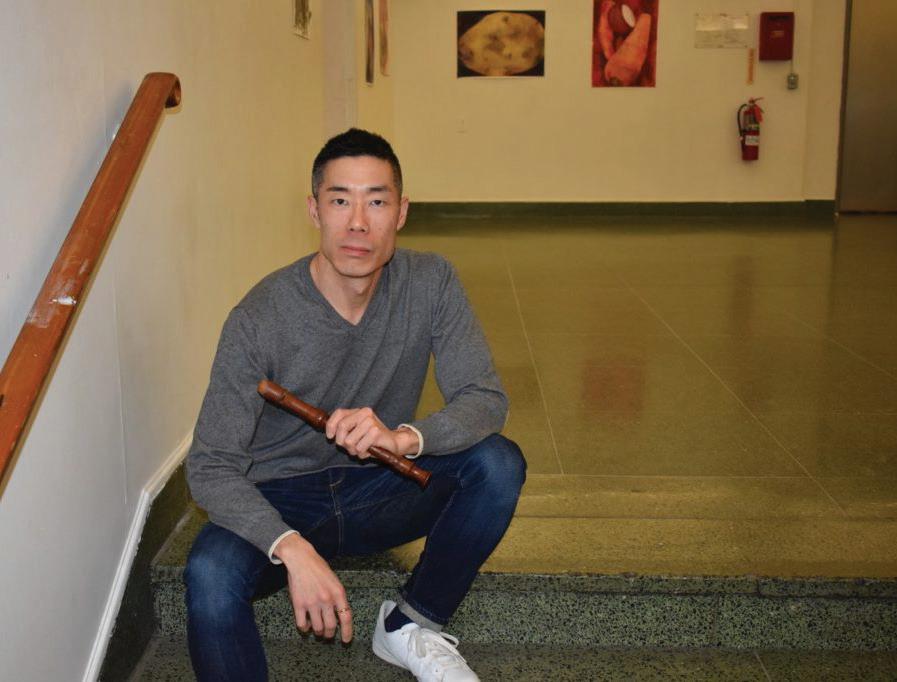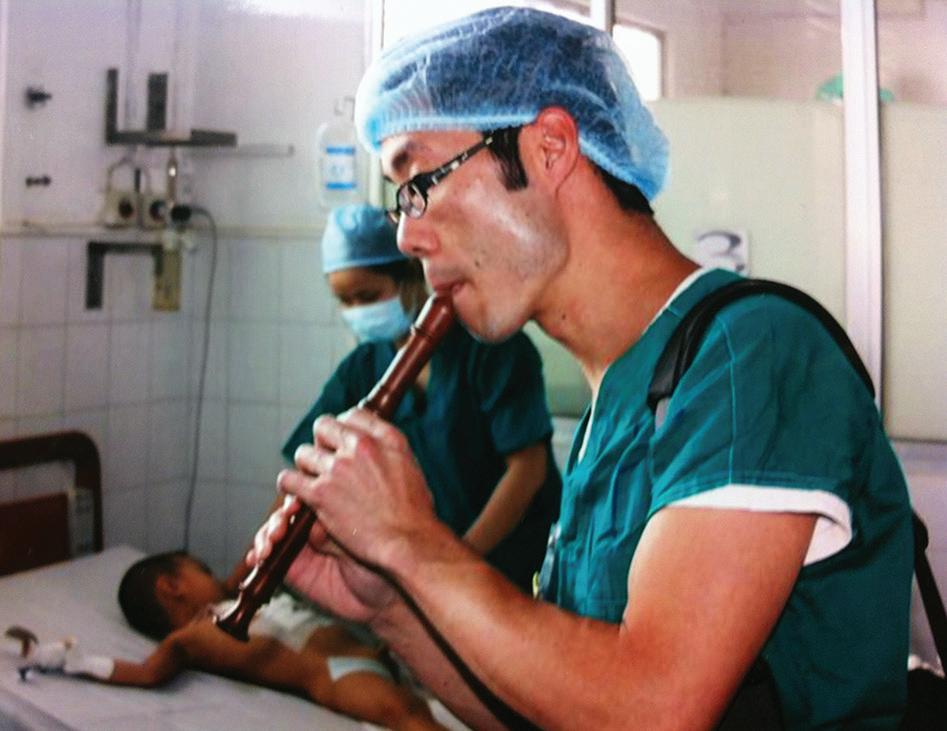
6 minute read
Titan Spotlight: Kinh Vu ’97
TITAN SPOTLIGHT Teacher’s
BY VALENTINE BRKICH ’97 Song
‘ME SEARCH’ REVEALS THE POWER OF MUSIC
In early 1975, just days before the end of the Vietnam War, Kính T. Vũ—who was then a greatly malnourished infant—was removed from an orphanage in Saigon (today Ho Chi Minh City) and airlifted to Orange County, Calif., where he was nursed back to health at the UCLA Medical Center.
Today, the 1997 Westminster alumnus is an assistant professor of music education for Boston University’s (BU) School of Music, where he focuses much of his research on the relationship between music and human displacement, something with which Vu is all too familiar.
“All of my research, to some extent, is mesearch,” says Vũ, who uses his own life experiences and knowledge of music as tools for addressing the global problem of structural violence—the act of some social or political undercurrent or institution that might prevent people from living to their fullest potential as human beings.
“Addressing issues of structural violence creates a space for arts making,” says Vũ, who has focused his human displacement research on prisoners in Massachusetts, women in Cambodia, refugees living in Sweden, and, of course, orphans in Vietnam.
“If we think deeply about, say, the forced human displacement we’re seeing in Syria’s Civil War, for example…people are being killed. They’re literally fleeing for their lives,” said Vũ. “I surmise that music can have a certain positive power for people who have been displaced. It can give them hope where there is none.”
Vũ started out at Westminster College studying religion and philosophy before switching to music education, with a focus on instrumental and choral pedagogy. He took part in marching band, concert band, concert choir, chamber choir, and other small ensembles.
But one of the best lessons Vũ ever received about teaching came—from all people—a football coach. His very first PE class at Westminster was racquetball, taught by former Head Football Coach Joe Fusco.
“He didn’t care that I wasn’t coordinated,” says Vũ. “Here I was, this scrawny 18-year-old kid from rural PA. Coach Fusco was always encouraging, helpful, patient. If any music teacher could observe this, they would see an awesome way to teach: meet the learner where he is and teach him. Fusco a big reason why I teach the way I do today.”
Another professor who had a lasting impact on Vũ was Dr. R. Tad Greig, director of instrumental activities and professor of music. “I remember coming back for my sophomore year and Tad gave me a leadership position in the marching band. That changed me. We developed a close relationship that continues to this day.”
“What has been consistent over the 22 years of our relationship as a student, and now esteemed colleague and friend, has been Kính’s desire to learn and enrich his own intellect,” says Greig. “The light of his life is only beginning to rise above the horizon, and I look forward, with great anticipation, to where this light will crest.”
Following Westminster, Vũ taught high school music for six years then earned a Master of Music in wind conducting from Penn State University in 2005. He taught high school band for another five years before earning a Ph.D. in music education from the University of Minnesota in 2013. As a doctoral student, he focused his dissertation on spoken-word poetry, rap and song of the Hmong people of Southeast Asia.
“Between 2010-13, the Hmong, like other people of color—Somalis, Latinos, Black/African Americans—were suffering police brutality in the Twin Cities,” says Vũ. “Hip-hop has long been used as a form of storytelling, restoration, resistance and resilience. One of my assignments as a first-semester doctoral student was to investigate the kinds of music happening among the cities’ young people.”
Vũ soon discovered a group of Hmong rappers on YouTube and was instantly accepted into their community. That’s when he first realized that music might have another function aside from purely entertainment or education. “I dedicated myself to learning the art of spoken-word poetry and, while I was there, got thrown under the bus at an open-mic event. And thus began my journey of social and political justice through teaching and learning music.”
Today Vũ takes what he learned from the Hmong and applies it to his own teaching, encouraging his students to get out into the community and share their art off campus. One of his students, for example, offers music classes to elementary school children. Others are partnering with people in the Boston Metro and “doing things that matter.”
Says Vũ, “For children and youth today, this type of experiential learning is vital. Whether they’re at BU or Westminster, students today must have practical experiences before they enter our schools and community centers as arts leaders.”

Currently Vũ is serving as a Faculty-In-Residence at Boston University’s Kilachand Hall, where he coordinates the Writers Corridor program that honors the life and works of American playwright Eugene O’Neill. Kinh Vu playing his recorder in the cardiology ward at Children’s Hospital Number 2 in Ho Chi Minh City, Vietnam
“My door is always open,” says Vũ, who hosts open hours for students looking for guidance, conversation or even just to hang out and enjoy some of his famous baked goods. “We hang out and talk about things like the election, Brexit, religion or even professors who give too much homework. These students are from all over the world. It’s a very diverse group spanning many disciplines. It’s a way for students to develop relationships with faculty members outside of the classroom; to see faculty not just as professors but as human beings.”
In addition to his on-campus work, Vũ also travels outside the U.S. frequently to give musical workshops and conduct research. This summer, for example, he will return to Cambodia to investigate how women in one Phnom Penh neighborhood are resisting music education in order to protect their community from further forced displacement.
Vũ, along with BU colleague André de Quadros, is co-editing a collection of stories about people from around the world who have been displaced and are using music as a form of resilience and restoration. Titled My Body Was Left on the Street: Music Education and Displacement, the book is due to be published in late 2019.
As for the many social issues and problems our world is facing today, Vũ thinks that music has a real potential to gather humans together to “make a joyful noise.”
“Maybe the world’s people, in engaging their hearts, hands, minds and bodies around artsmaking, can inspire others to join in our songs; to speak and to sing and to play messages of hope, joy, sadness, resistance, and resilience; to create an unbounded bliss that will draw the attention of others who never thought that what we are doing—whoever we are—is important.” S
DRESS the BAND
The Titan Marching Band is due for an upgrade!
Well, not the band. They’re fantastic. But those uniforms have seen better days.
While the current marching band uniforms have served our musicians well for more than 20 years, the time has come to replace them. The quality of the uniforms should match the impressive performances of our students.
The opportunities to make an impact are wide ranging. From $20 plumes to funding an entire uniform for $500, each dollar will go directly toward outfitting our musicians.

We need your help reaching our goal of 120 new uniforms by June 30 so that we can #DressTheBand this fall!
To provide your support or for more information, please visit westminster.edu/DressTheBand.










